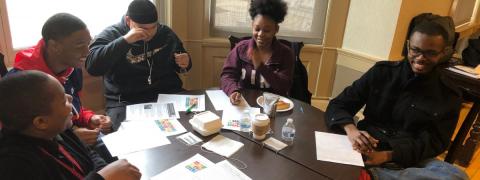The CWRU Provost Scholars program was founded 10 years ago with the goal to improve academic outcomes and strengthen career goals for underserved middle and high school students at two East Cleveland City Schools. Since then, the partnership program has grown to serve students at East Cleveland’s Kirk Middle School and Shaw High School, as well as the Cleveland Metropolitan School District’s Ginn Academy.
“This program started with an idea and 10 students. And now we have 30 students and a waiting list,” explains Provost Scholars Program Director Faye Gary, who also is the Medical Mutual of Ohio Kent W. Clapp Chair and Professor of Nursing at the Frances Payne Bolton School of Nursing. “The purpose of the Provost Scholars Program is to foster academic excellence and social-emotional development to the highest possible degree—and we don’t ever want to sacrifice that.”
Thanks to the program’s committed participants as well as the involvement of their parents, Case Western Reserve faculty mentors, CWRU student tutors and champions like Gary herself, sacrificing high standards isn’t—and can’t be—an issue.
Selection for the Provost Scholars program is by invitation and application. To be eligible, students must be enrolled in grades 8 through 10 at a partner school and possess the following: a minimum 2.5 grade point average; a record of excellent attendance and punctuality; and two recommendations from school administrators or teachers. They also must submit an application that includes a 500-600 word essay, a completed Provost Scholars Profile and signed parent and Provost Scholar agreements.
The commitment to Provost Scholars is hardly a small one. Scholars embark on a multiple-year pathway that brings them to Case Western Reserve twice a week for two-and-a-half hours each time—they come on Tuesdays to meet with their assigned faculty mentors and on Thursdays to meet with CWRU student tutors and to attend University Seminars. University Seminars include weekly lectures on topics such as resume basics, SAT test prep, sustainability and the college application process, among others. In the summer, Provost Scholars attend the Summer Learning Institute, a four-week program that includes ACT test preparation, advanced academic coursework in math and science, and a capstone project. The goal of the summer program is to build leadership skills.
In addition, the parents of Provost Scholars attend monthly meetings as part of the Parents’ College, a program designed for parents to hear lectures from leaders and experts and to learn how they can better support their Provost Scholars. “This way, parents can get to know their scholar’s mentor. They can get to know us, what our rhythm is and what our core values are. And more specifically, they come to understand their impact on their children’s lives—that’s something we often have to help them understand because not all parents do,” Gary says.
Recently, the program also expanded to include a research opportunity for students at the Case Comprehensive Cancer Center. The four-week program, called Emerging Research Scholars, is intended to spur interest in science and research careers among underserved students of color. That program, in turn, led to a spin-off learning opportunity for the faculty at Ginn Academy. “The students in the program were coming back and telling their teachers about the cancer cells they’d seen under a microscope in the lab and they wanted to know more from their teachers at school,” says Gary. “But the teachers didn’t have that depth of knowledge, so we arranged for a tour of the labs for the faculty so that they could enhance their understanding.”
Gary says this is often how the program evolves—to serve the needs of the students and the partner schools. But in the meantime, the program continues to succeed because at its core, it is focused on the wellbeing of the student and building positive relationships with adults.
“The crown jewel of this program is the opportunity to work with the students,” Gary says. “I started with my mentee when she was 13-years-old—and now I’m going to attend her graduation at Ohio State and she’s going to get her master’s degree. Our mentors take a long-term approach to relationship building so that the students know that we are always there.”


